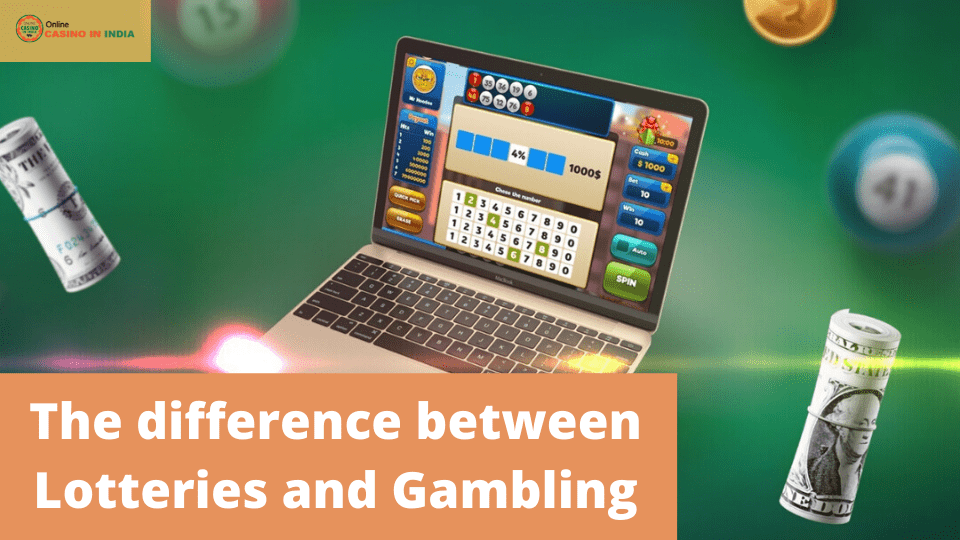Introduction
When it comes to games of chance, two terms often come up: lotteries and gambling. While both involve taking risks in the hopes of winning something, there are distinct differences between the two. In this article, we will explore the dissimilarities between lotteries and gambling, shedding light on their unique characteristics and how they operate.
Lotteries and Their Nature

Lotteries are games of chance that involve drawing random numbers for a prize. They have a long history, dating back to ancient times. In a lottery, participants purchase tickets with specific number combinations, and winners are determined through a random selection process. Lotteries are typically run by governments or licensed organizations, with proceeds often directed toward public causes.
Types of Gambling

Gambling, on the other hand, refers to a broader category of games that involve wagering money or something of value on an uncertain outcome. It encompasses various activities such as casino games, sports betting, poker, and more. Unlike lotteries, gambling can take place in both regulated establishments and informal settings.
The Role of Skill and Chance

While both lotteries and gambling rely on chance, there is often a distinction in the role played by skill. In the lottery, luck primarily determines the outcome, as the numbers are drawn randomly. Gambling, however, can involve an element of skill, such as strategic decision-making or card counting in poker. The degree of skill required can vary depending on the game.
Regulations and Legalities
Lotteries are subject to strict regulations and are often operated or supervised by government entities. The rules governing lotteries are established to ensure fairness, transparency, and integrity. On the other hand, gambling regulations can vary significantly across different jurisdictions. Some countries have legalized and regulated gambling, while others have imposed restrictions or outright bans. Impact on Society
Lotteries and gambling have distinct impacts on society. Lottery, due to their association with public funding, contribute to various sectors such as education, healthcare, and infrastructure. They can also generate excitement and provide entertainment value to participants. Gambling, on the other hand, can lead to both positive and negative consequences. While it can contribute to local economies and tourism, it also carries risks such as addiction and financial hardship.
Advantages of Lotteries
Lotteries offer several advantages over other forms of gambling. Firstly, they are accessible to many individuals, as tickets are often affordable and readily available. Additionally, the lottery provides a sense of hope and anticipation, as anyone has a chance to win a substantial prize. Moreover, the funds generated from lottery ticket sales can support various social causes, benefiting the community as a whole.
Benefits and Drawbacks of Gambling
Gambling provides certain benefits to individuals who enjoy the thrill of taking risks. It can offer entertainment, social interaction, and the potential for monetary gains. However, gambling also carries inherent risks. Excessive gambling can lead to addiction, financial strain, and strained relationships. It is crucial for individuals to engage in responsible gambling practices and seek help if needed.
The Psychology Behind Lottery and Gambling
Lotteries and gambling both tap into the psychology of risk and reward. The anticipation of winning a prize triggers a surge of excitement and dopamine release in the brain. This psychological aspect contributes to the popularity of both activities. However, the psychological experience of participating in a lottery versus gambling can differ due to instant gratification versus prolonged gameplay.
Factors Influencing Participation
Various factors influence an individual’s decision to participate in lotteries or gambling. These factors include personal preferences, cultural norms, social pressure, and the perceived odds of winning. Additionally, the availability and accessibility of lotteries or gambling opportunities play a significant role in determining participation rates.
Addiction and Responsible Gambling
Both lotteries and gambling carry the risk of addiction, although the prevalence may vary. Addiction can lead to adverse consequences such as financial difficulties, strained relationships, and overall well-being. It is important for individuals to recognize the signs of addiction and seek help through responsible gambling resources and support networks.
Financial Implications
Participating in lotteries or gambling activities can have financial implications. While winning a lottery jackpot can result in a life-changing windfall, the odds of winning are usually quite low. It is crucial for individuals to approach lotteries and gambling with a budget and never exceed their means. Responsible financial management is key to mitigating potential risks.
Lotteries and Gambling in Popular Culture
Lotteries and gambling have made their way into popular culture through movies, books, and other forms of media. They have been depicted in various ways, often showcasing the allure, excitement, and potential consequences of participating in these activities. Pop culture representations can shape public perception and influence attitudes toward lotteries and gambling.
Lotteries vs. Gambling: Which One Should You Choose?
The choice between lotteries and gambling ultimately depends on personal preferences and priorities. The lottery offers a simple and straightforward approach, providing an opportunity to win significant prizes while contributing to public causes. On the other hand, gambling offers a broader range of options and requires varying levels of skill. It is essential to consider individual risk tolerance, financial capabilities, and enjoyment factors when making a decision.
Conclusion
In conclusion, lotteries and gambling share some similarities as games of chance but also have distinct characteristics. A lottery involves random number drawings and often supports public causes, while gambling encompasses a wider range of activities that involve wagering on uncertain outcomes. Both have their advantages and risks, and it is crucial for individuals to approach them responsibly, understanding the potential impact on their lives and seeking help if needed.

